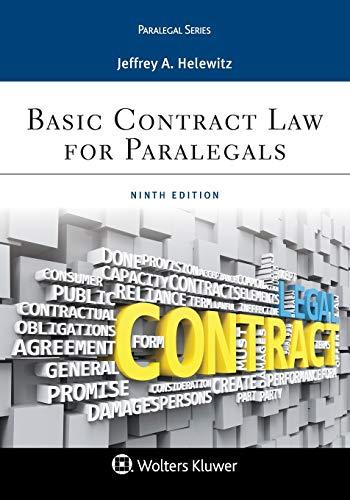ConAgra Foods, Inc. (ConAgra) conducted an annual promotion to help end child hunger from 2011 to 2015.
Question:
ConAgra Foods, Inc. (“ConAgra”) conducted an annual promotion to help end child hunger from 2011 to 2015. The company would donate a certain amount—up to a yearly maximum—to a non-profit organization called Feeding America for every code entered on its website from certain ConAgra products’ packaging. Kevin McCabe filed suit in the Eastern District of New York, alleging that ConAgra’s promotion created a contract.
He brought claims for breach of contract and violation of the District of Columbia Consumer Protection Procedures Act (“DCCPPA”), D.C. Code §§
28-3901-3913.
A. Contract Claim Pursuant to New York law, on which both parties rely in connection with this contract claim, the elements of a cause of action for breach of contract are: the existence of an agreement, performance by the plaintiff, breach of contract by the defendant, and resulting damage. Eternity Glob. Master Fund Ltd. v. Morgan Guar. Trust Co. of N.Y., 375 F.3d 168, 177 (2d Cir. 2004). An agreement stems from “a manifestation of mutual assent sufficiently definite to assure that the parties are truly in agreement with respect to all material terms.” Express Indus. and Terminal Corp. v. N.Y. State Dep’t of Transp., 93 N.Y.2d 584, 715 N.E.2d 1050, 1053, 693 N.Y.S.2d 857 (N.Y. 1999); see also Arbitron, Inc. v. Tralyn Broad., Inc., 400 F.3d 130, 137 (2d Cir. 2005). An agreement generally requires an offer and an acceptance. The general rule in New York is that a promotion or advertisement is not an offer. Leonard v.
Pepsico, Inc., 88 F. Supp. 2d 116, 122-23 (S.D.N.Y. 1999), aff’d, 210 F.3d 88 (2d Cir. 2000). An advertisement can constitute an offer when it is “clear, definite, and explicit, and leaves nothing open for negotiation.” Id. at 123 (quoting Lefkowitz v. Great Minneapolis Surplus Store, Inc., 251 Minn. 188, 86 N.W.2d 689, 691 (Minn. 1957)); Amalfitano v. NBTY Inc., 128 A.D.3d 743, 744, 9 N.Y.S.3d 352 (N.Y. App. Div. 2d Dep’t 2015), leave to appeal denied, 26 N.Y.3d 913, 22 N.Y.S.3d 165, 43 N.E.3d 375 (N.Y. 2015).
We agree with the district court that McCabe failed plausibly to allege the existence of a unilateral contract for each year from 2011 through 2014. A unilateral contract was not formed, inter alia, because the promotion was limited to a certain maximum donation per year. See Amalfitano, 128 A.D.3d at 744 (promotion was an invitation for offers, not an offer, because it expressly stated that supplies were limited). An individual entering a code would have no knowledge whether the maximum donation had been reached in 2011, 2012, 2013, or 2014. Cf. Lefkowitz, 86 N.W.2d at 691 (potential customer knew that he was the first one in line for a “first come, first served”
opportunity). Thus, ConAgra’s promotion was not an offer because McCabe and the other plaintiffs had no “power of acceptance.” See Leonard, 88 F.
Supp. 2d at 123 (quoting Mesaros v. United States, 845 F.2d 1576, 1580 (Fed. Cir. 1988)).
The district court also concluded that McCabe did not plausibly allege the existence of a bilateral contract for each year from 2011 through 2015, and we agree. Under McCabe’s bilateral contract theory, the terms of participation constituted an invitation for an offer. The entry of a code by a promotion participant then was an offer which ConAgra supposedly accepted by acknowledging the code’s receipt. ConAgra’s supposed invitation for offers, however—made prior to any code entry—was insufficiently definite to set the terms of the “offer” supposedly made on entry of a code, and McCabe fails to allege facts suggesting that the code entry in any way clarified the terms on which an alleged bilateral contract was created.
McCabe alleges that, in 2015, an individual entering an online code would know whether the yearly maximum donation had been reached because of a counter used during that year’s promotion on the promotion website. Thus, he claims, a unilateral contract was formed at least as to this year. But even assuming arguendo that the individual was aware of whether the yearly maximum donation had been reached and that the terms of the offer were sufficiently definite, McCabe fails to allege that ConAgra breached that contract. Nowhere does he state that ConAgra did not make the 10-cent or 20-cent monetary donation to Feeding America upon the entry of an online code—the only promotion term arguably definite enough to constitute an offer. He merely criticizes the methodology that Feeding America used to calculate the cost of providing a meal. Therefore, McCabe fails to state a claim for breach of contract even as to the 2015 promotion.
Questions
1. What are the requirements for maintaining a breach of contract claim?
2. What facts led to McCabe losing his claim?
3. What is the court’s interpretation of ConAgra’s advertisement?
Step by Step Answer:






